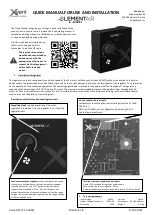
67
ENGLISH
7. START-UP PROCEDURE
• All access panels on the unit must be closed before starting.
• Make sure that the earth connection is securely connected.
• First turn on the water circulation pump. Wait several minutes to make sure the flow of
circulation remains steady and that there is no variation in the flow. Make sure that any
air bubbles have been drawn to the bleed points and that they have been bled off.
• Make sure that the pressures in the unit do not exceed the maximum pressure for the
exchanger coils.
• Continue to run the circulation pump for at least 2 hours. Turn off the pump and then
remove the filter from the unit. To do so, close the appropriate shut-off valves to prevent
the water line from emptying, and to prevent air from getting in. Then clean the filter.
• Take a careful look at the particles trapped in the filter. Make sure that these particles
are not coming from a source that will clog the filter again (such as pipe scale from iron
pipes, hard water deposits, etc.).
• Re-insert the filter, bleed the air from the system and turn the circulation pump on
again. Wait several more minutes to make sure that the flow of water remains steady and
there is no variation in the flow. If good water circulation is not achieved, repeat the steps
described above.
• Before turning on the power to the unit, check to make sure that nothing is hindering the
movement of the regulator dampers if these are operated using a servomotor.
• If the damper are manually operated, make sure by manually tightening the control that
they cannot be closed due to the force of air or anything else while the unit is running.
• Turn on the external main power switch to the unit, keeping the control switch in the off
position. After that, check to make sure the input voltage at the unit’s electrical termi-
nals matches the one indicated on the identification plate (the minimum voltage will be
10% below the rated voltage indicated on the identification plate).
• Do not start up the fan if the duct network is not completely closed, since turning on the
fan with no load can cause over-currents that cause wear to the motor. This can also
occur if the static pressure demanded is greater than the pressure losses that occur in
the duct network. To fix this, close the flow regulator dampers so that there is a greater
pressure loss.
• Turn on the external control switch and stop it a few seconds later.
• Make sure that the motors are rotating in the direction set by the manufacturer (note the
direction of rotation marked on the fan). If the direction of rotation is incorrect, swap the
power phases. To do so, disconnect the unit control switch and the main switch and then
swap the phases.
• Once you’ve checked the direction of rotation, if you have not noted any strange noises,
you may turn the unit on again.
• Test fan and motor rotation speed using a tachometer.
• Make sure that the unit receives adequate air flow, or else its performance will be se-
riously compromised.
Содержание UTBS Series
Страница 2: ......
Страница 110: ......
Страница 111: ......
Страница 112: ...Ref 9023027900 C Llevant 4 08150 Parets del Vall s Barcelona Tel 34 93 571 93 00 Fax 34 93 571 93 01 www solerpalau com...
















































